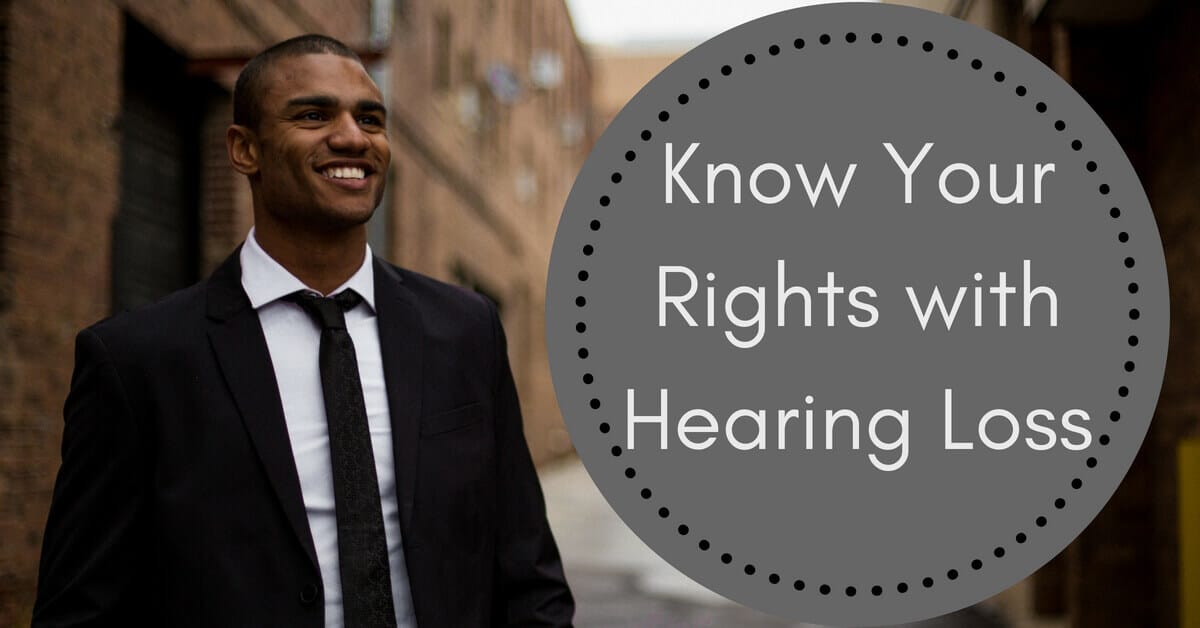
- A Step-by-Step Look at How Hearing Aids Make Sounds Sharper - May 5, 2025
- Causes of Conductive Hearing Loss? - April 27, 2025
- Can Treating Hearing Loss Reduce Stress? - April 15, 2025
When you have hearing loss, it can make you feel vulnerable. Important sounds may escape your hearing, leading to missed opportunities and even potentially dangerous situations. From gaining employment to recognizing a fire emergency to handling an encounter with law enforcement, people with hearing challenges deserve a world that provides them with justice and safety.
If you have hearing loss, knowing your rights is an important step towards accessing resources and accommodations for your disability. The Americans with Disabilities Act (the ADA for short) is a great place to start. The ADA became law in 1990 and outlines the equal rights of persons with disabilities as well as ways those rights will be ensured and recourse for when those rights are violated. The ADA covers 4 major areas – the right to equal employment, access to government processes, public accommodations and telecommunications.
While the ADA clarifies the rights of the disabled in many areas, the fight to access and justice continues. The Hearing Loss Association of America (HLAA) keeps watch on policy and law regarding the hearing impaired on their “Know Your Rights” webpage, an excellent resource for advocating for your rights and keeping abreast of contemporary issues.
Your Rights as a Worker
The ADA protects your rights as a worker. Employers cannot ask about your hearing loss as part of an application or interview for a potential job. Additionally, they are responsible for making reasonable accommodations to the workplace so you can successfully perform your job and participate in the employee communication.
While covering hearing health care is not required by law, the Occupational Health and Safety Administration (OSHA) has regulations that require employers protect their employees from hazardous noise levels with appropriate hearing protection.
Children’s Rights
Children with hearing loss are promised a public education that accommodates their hearing loss with effective and appropriate assistive technologies. Educational rights extend the promises of the ADA into the classroom to make education available and obtainable for children who are learning with hearing loss challenges.
Your Rights in Public
The ADA puts into place policy to standardize the rights of people with hearing loss and other disabilities to fully participate in society and access to public spaces and services. Under ADA law public institutions are required to provide assistive accommodations to visitors with hearing loss free of charge. Often, accommodations for hearing loss require some advance notification, particularly for interpretive services.
Under the ADA theaters, hotels, libraries, museums, stadiums, schools, courtrooms and convention centers are all required to provide appropriate accommodation for hearing disabilities. Although it often involves advance planning, ADA accommodations can help provide you with a fuller, safer experience of the world. Hotels and motels are often equipped to provide vibration-based alarms and alerts in case of emergency. Courtrooms are required to provide interpretive and assistive services as a part of a fair trial.
Your Rights in Government
In order to be able to fully participate in democracy, the ADA also outlines that government at every level be made accessible to persons with disabilities. This right to access and participate includes services to help people with hearing loss follow verbal debate and meetings. To access some interpretive services, governing agencies may require you contact them in advance of a meeting to make arrangements.
More Ground to Cover
Additional struggles to secure rights for the disabled more forward, building on the foundation the ADA has established. Recent years have seen the passage of the Airline Carriers Access Act and the Twenty-First Century Communications and Video Act of 2010 which further expand the access rights of persons with disabilities.
An important civic frontier is working to secure the rights and safety of persons with disabilities when dealing with law enforcement. Misinterpretation of verbal instructions and cues can place persons with hearing loss can escalate into a dangerous misunderstanding without recourse for the hearing-challenged person. Working to form effective strategy and policy around safety within the law can help further protect people with hearing loss from harm and discrimination.
Hearing Aid Specialists of the Central Coast
Dealing with hearing loss isn’t always simple, but at Hearing Aid Specialists of the Central Coast we can make it easier. Our audiological services incorporate comprehensive testing and hearing solutions tailored to your needs. We bring a wide selection of hearing aids and assistive options
